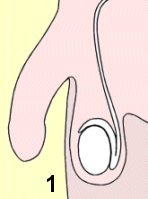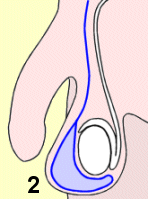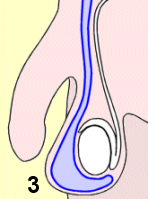|
Physical Problems in Males
|
|
Hydrocele
|
|
A hydrocele (from gr. hydor: “water” + kele: “break” or “cavity”) is a collection of fluid around the testicle. The condition is not uncommon in newborns, but rare in adults. Most often, a hydrocele appears only on one side. Hydroceles on both sides occur in only about 10% of the cases.
In most cases, a hydrocele is congenital, i.e. a baby boy is born with it. The cause is this: When the testicles descend into the scrotum before birth, a sac and some fluid from inside the abdomen move down along with it. The sac usually closes, and the fluid is absorbed. However, if it cannot flow back upward and remains inside the closed sac, it produces a so-called non-communicating hydrocele. This condition usually corrects itself within the first 18 months of life.
In some cases, the sac itself remains open, and the fluid can travel up and down between scrotum and abdomen. In this case, one speaks of a communicating hydrocele. It is smaller after a night’s rest and larger after a day of activity.
|
|
|
|
|
1 Normal scrotum 2 non-communicating hydrocele 3 communicating hydrocele
|
|
Treatment
A small hydrocele that produces no symptoms does not require treatment. However, if it produces discomfort or becomes too noticeable because of its size, medical treatment may be indicated. A hydrocele appearing in an adult may indicate some internal injury or serious underlying disease. Therefore, a thorough examination and careful diagnosis - ruling out other problems - are always necessary. Two of these other problems may be a hernia or testicular torsion (see there). An obvious hydrocele in an infant boy older than 18 months may also require medical attention. Very often, hydroceles tend to get larger over time. The most common treatment is surgery, sometimes combined with needle aspiration and the injection of some medication.
|




